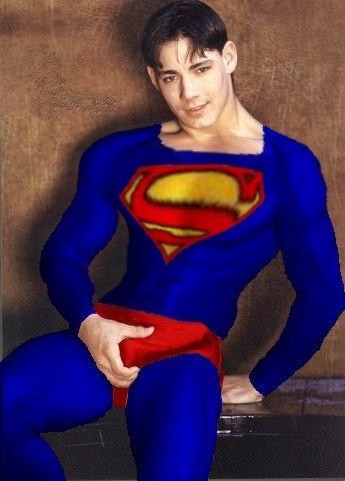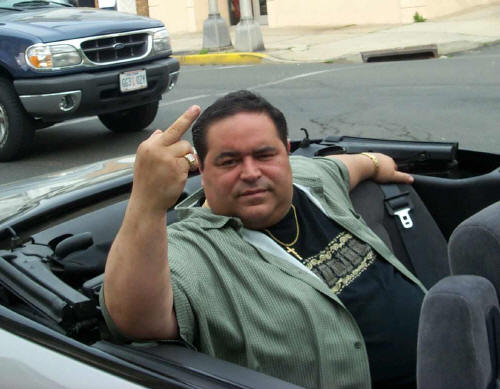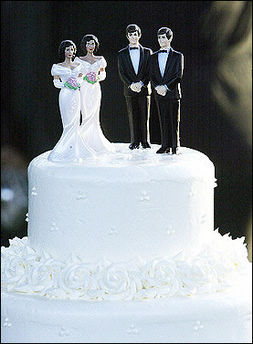skip to main |
skip to sidebar
 As superman prepares for his latest star turn in ‘‘Superman Returns,'' opening June 28, some interesting headlines have begun to appear in the nation's media.
As superman prepares for his latest star turn in ‘‘Superman Returns,'' opening June 28, some interesting headlines have begun to appear in the nation's media.
The Advocate, May 23: ‘‘How Gay Is Superman?''
Los Angeles Times, June 2: ‘‘Beefcake in Tights: Does Gay Appeal Help Ticket Sales?''
New York Times, June 4: ‘‘It's a Bird! It's a Plane! It's the Man of ... Feelings!''
OK, the question is out there: Is Superman gay?
Here's the answer: Let's hope so.
If Superman was straight, we'd see the difference right away. There would be major problems.
For one thing, Superman wouldn't look nearly as cool.
There is no way a straight man is going to zip around town in a muscle shirt, tights and a billowing cape.
No, if Superman was straight, he'd shlub around in dorky looking clothes, complete with a ballcap. He wouldn't cut a dramatic figure at all, like he does now.
Also, he wouldn't be buff. He wouldn't have that chiseled torso and those bulging muscles that strike terror into the hearts of evil-doers.
Instead of the Man of Steel, he'd be the Man of Pudding. He'd have a gut, and slouching shoulders, and probably a big butt. Maybe even a plumber's crack. He'd walk like a duck.
If Superman was straight, he wouldn't come back from work with every hair still in place, with that one perfect spit curl still dangling jauntily over his brow. No, saving the world involves a lot of heavy lifting and exertion. If Superman was straight, his hair would be a mess. He'd look like a wild man.
Superman is being seen in a new light, and it's little wonder, because this is a new era. Gays and straights co-exist more comfortably now. Gays are more visible, more forward. Straights are more understanding, more accepting.
Generally speaking.
Nobody would have dared call Superman gay when he burst onto the scene a half century ago. It was the '50s, after all, and people didn't have a clue. They even thought Liberace was straight, for crying out loud.
Today, we are more aware. We know our society is diverse, and that people of all kinds can be achievers, leaders and role models. We take our heroes whenever and wherever we can find them, and we judge them by the works they do.
Generally speaking.
If Superman was straight, he not only would look different, he would act differently.
And we would find the changes discomfitting.
For example, Superman wouldn't duck discreetly into a phone booth to change clothes. No, he'd just rip off his bowling shirt right in public. He'd be totally uncouth about it.
He wouldn't care what he looked like, or what people thought of him. In fact, he'd probably walk around most of the time with his shirt half unbuttoned, and his Superman insignia hanging out for all to see.
Some disguise.
If Superman was straight, he wouldn't go off to his isolated Fortress of Solitude for periods of reflection and meditation. No, if something was bugging him, a straight Superman would go to Hooters and drink shooters. So much for deep thoughts.
If Superman was straight, he wouldn't tidy up after himself, the way he does now. Superman not only catches the train as it falls from a collapsing bridge, he goes back and fixes the bridge.
If he destroys a building, in the course of vanquishing a villain, he puts up a new building to replace it. He probably even washes the windows and does light mopping and dusting.
A straight Superman would not be this fastidious.
If Superman was straight, he wouldn't remain aloof from the opposite sex. No, he would be getting tangled up with them right and left. He probably would have married Lois Lane years ago, and today he would be sitting around the house in his underwear with the TV remote balanced on his belly.
The Battle for Truth, Justice and the American Way is a Neverending one. There is no time left over for the Battle Between the Sexes.
Superheroes must refrain from such distractions. We see this borne out again and again, not only with Superman but with Batman and Spider-Man.
And please, let's not even get started on those guys.
from The Daily Bulletin by John Weeks
 There was no mistaking the man or the message when Joe Gannascoli left a message on this writer's voicemail a few days ago: "Gay Vito. How are ya?"
There was no mistaking the man or the message when Joe Gannascoli left a message on this writer's voicemail a few days ago: "Gay Vito. How are ya?"
After 40-some-odd episodes of "The Sopranos," Gay Vito is now Dead Vito, or permanently indisposed Vito - an intriguing and harrowing fixture no more. (Although Gannascoli doesn't rule out the possibility that Vito could reappear in Sunday's season finale in a flashback sequence.)
But what does the actor behind one of the most indelible characters on TV's most in- delible program do for an encore? That is the question that has dogged Gannascoli's every step since his character's death at the hands of Phil Leotardo's mooks on May21's episode.
Where to begin? Joining a list of published "Sopranos" authors - including Frank Vincent, who plays Leotardo - Gannascoli has a book out, co-written with Allen C. Kupfer, "A Meal to Die For: A Culinary Novel of Crime." There's a bit part in the forthcoming movie "Beer League," starring Artie Lange and Ralph Macchio. Otherwise, "it's hard to follow the work in this ['The Sopranos']. I have to be careful [about] my next thing. But right now, I'm living in East Rockaway [and] working on my house.... That's it."
Well, not quite it. After his "Sopranos" storyline wrapped, he was asked to "do meetings" with the major networks. "NBC had ideas for shows that if they got picked up, they thought I'd be ideal for [and] wanted to know if I'd be willing to relocate."
But one is left with feeling that while Gannascoli is willing to do whatever it takes to continue his acting career - which began, more or less, in the mid-1990s with a small role in "Ed Wood" - he has more interest in cooking and sports than the thespian trade. A lot more. This Brooklyn native is an accomplished cook (and Yankees fan), so he's got this idea for a cooking sports show. The name? "Sports Bowl." To keep up, you can also go to his Web site, www.joesoup.com.
from Newsday
 'That's vanity ... not politics," President John F. Kennedy once snapped at an aide who wanted him to provoke a confrontation with Congress on an issue Kennedy knew he didn't have the votes to pass.
'That's vanity ... not politics," President John F. Kennedy once snapped at an aide who wanted him to provoke a confrontation with Congress on an issue Kennedy knew he didn't have the votes to pass.
Times change, don't they?
Now many in Washington believe the essence of politics is provoking confrontations over issues that have little chance of becoming law but a high probability of dividing the country.
Exhibit A is this week's planned Senate vote on a proposed constitutional amendment to prohibit gay marriage. No one doubts the outcome. Proposed constitutional amendments require a two-thirds majority — 67 votes — to clear the Senate. When the Senate last considered the gay marriage ban, in July 2004, supporters mustered only 48 votes on a procedural test. The backers might do better this time, but they are unlikely to get close to the votes they need.
One big reason is that supporters haven't built a clear majority for the momentous step of amending the Constitution. In surveys, most Americans say they oppose legal recognition for gay marriages. But many appear comfortable allowing the states, which have traditionally regulated marriage, to handle the issue.
In the latest Gallup Poll, 50% said they supported a constitutional ban on gay marriage; 47% opposed it. Nine other Gallup surveys since 2003 have produced similar results. There's no evidence supporters have established the overwhelming social consensus that should accompany any effort to amend the Constitution on this issue.
But like so much else in contemporary politics, the Senate vote isn't designed to produce a law; it's intended to pick a fight. The White House and Senate GOP leadership are betting that a noisy confrontation over gay marriage will encourage turnout this November from conservative voters — many of whom, polls show, are discouraged over President Bush's second term.
That strategy may help Republicans in some red states this year. But it could also deepen the image of intolerance hurting the GOP in many white-collar suburbs outside the South. Either way, these near-term, tactical calculations don't represent the most important political consequence: Both parties may pay a long-term price if manufactured cultural clashes such as the gay marriage amendment continue to control the spotlight.
Whatever else Americans may think about gay marriage, few consider it one of the country's most serious moral challenges. By elevating it so prominently, this week's debate is likely to deepen the sense that Washington is fixated on the preoccupations of ideological minorities while slighting most Americans' day-to-day concerns.
That danger is captured in a national survey due to be released Monday by the liberal Center for American Progress. The survey, conducted in late February, underscores the importance of religion and morality in Americans' lives. Nearly three-quarters of those polled said they prayed at least once a day, and just over half said they attended religious services at least once a week. Concern that the country had lost its moral compass was widespread.
But the survey demonstrated again that the moral issues people worried about most in their daily lives were very different from the ones dominating political debate. The survey asked Americans to name the most serious moral crisis in America today. Atop the list, 28% cited "kids not raised with the right values." Next came corruption in government and business, followed by greed and materialism, people too focused on themselves, and too much sex and violence in the media. Only 3% named abortion and homosexuality as the nation's top moral challenge. Even among those who attend religious services most often, just 6% picked abortion and homosexuality.
These findings challenge the values agenda of both parties. They do point to priorities different from the conservative focus on gay rights and abortion. But they also suggest liberals don't hit the mark either when they try to signal their values simply by describing causes, such as reducing poverty, as moral imperatives.
"There is a deep hunger to get away from religion being associated solely with the antiabortion and anti-gay marriage agenda — there is a deep public yearning for an alternative moral vision," said John Halpin, a senior fellow and opinion analyst at the Center for American Progress. "But it's not just talking about the left's issues and tagging the word 'moral' on it. You have to talk to people at a personal and family level about what faith and values mean."
Public policy can't easily reach all of these anxieties. But it can address some of them. Government can do more to support parents who believe they are competing with a rapacious marketplace to shape their children's values.
One example: The day after the Senate rejected the gay marriage amendment in 2004, it gave broad bipartisan approval to legislation that would have empowered the Food and Drug Administration to regulate tobacco — including the marketing of cigarettes to young people. That idea died when the House said no. Senators from both parties are pushing the tobacco issue again. Surely a Senate leadership that has time for a symbolic statement about gay marriage could find a moment to help parents fight the tangible problem of teen smoking.
Washington might support parents in many other ways. (President Clinton pioneered this path, although often with modest steps, with the "tools for parents" initiatives he launched in his first term.) But, as Halpin suggests, Americans probably aren't looking to Washington for programs so much as evidence it understands the cultural forces pressing upon communities and families.
It's difficult to see how the Senate sends that signal by squandering its time on a choreographed argument over gay marriage staged for no higher purpose than dividing the country.
from The Los Angeles Times
 As superman prepares for his latest star turn in ‘‘Superman Returns,'' opening June 28, some interesting headlines have begun to appear in the nation's media.
As superman prepares for his latest star turn in ‘‘Superman Returns,'' opening June 28, some interesting headlines have begun to appear in the nation's media.

